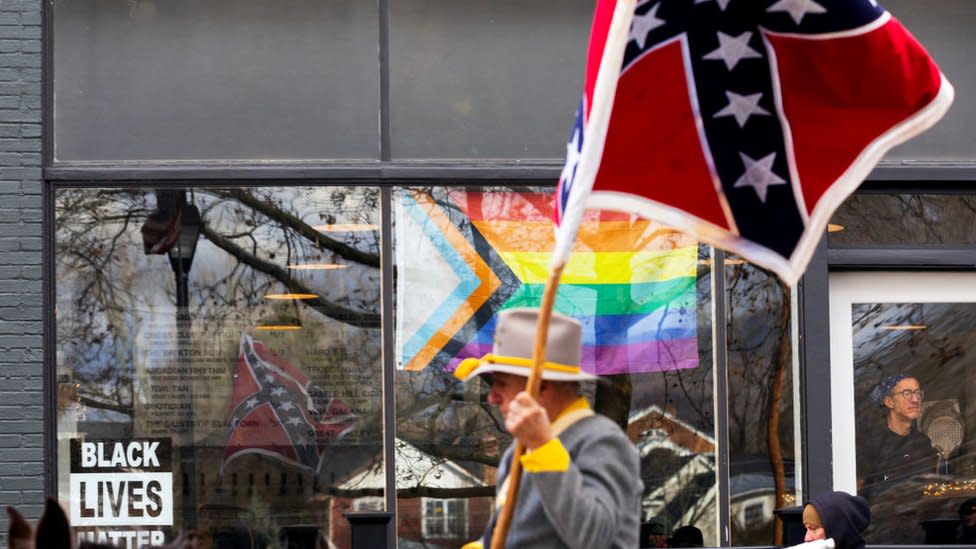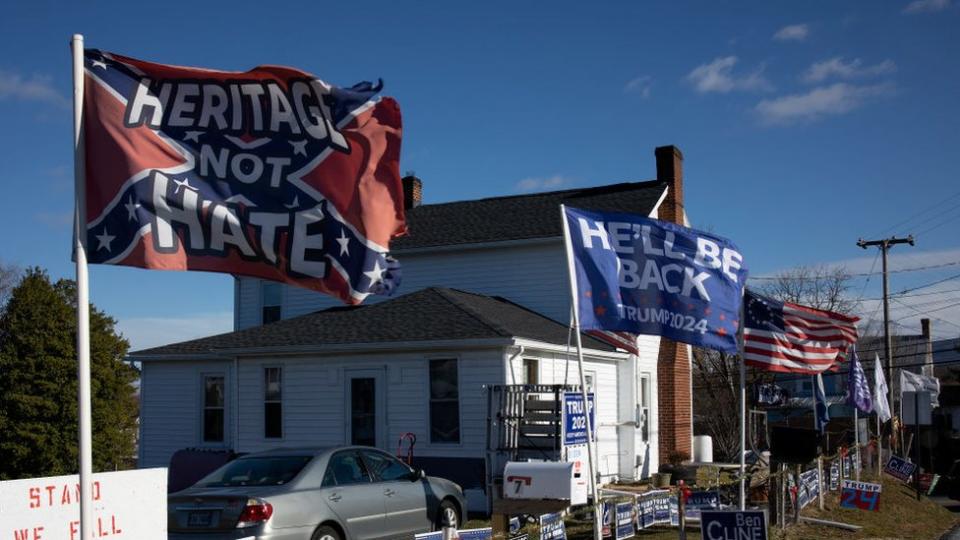Virginia school board votes to restore Confederate names

- Oops!Something went wrong.Please try again later.
- Oops!Something went wrong.Please try again later.
A Virginia school board has approved a motion for two schools to revert to their Confederate names following a debate that bitterly divided a town.
The Shenandoah County School Board voted 5-1 to reinstate the names of Stonewall Jackson High and Ashby-Lee Elementary in Quicksburg.
Community members had been pushing for a reversal, arguing the 2020 name change was unpopular.
The vote marked the first such U-turn anywhere in the US.
A large crowd flocked to the school board's public meeting on Thursday to listen to a series of arguments from residents on both sides of the issue.
Following the May 2020 murder of George Floyd and a summer of racial justice unrest, Virginia and other states took down Confederate statues from public spaces.
In a letter to school board chairs across the state, then-Democratic Governor Ralph Northam said: "It is time to change school names and mascots that memorialize Confederate leaders or sympathizers."
The Shenandoah County School Board took action three days later, moving to rename Stonewall Jackson High as Mountain View High, and Ashby-Lee Elementary as Honey Run Elementary.

The schools were named after Confederate generals Robert E Lee and Stonewall Jackson, and cavalry commander Turner Ashby.
In doing so, the six-member panel also approved a resolution condemning racism and affirming its "commitment to an inclusive school environment for all".
But some critics slammed the renaming effort as a hasty and undemocratic move, and have since attempted to restore the schools' Confederate names as local elections reshaped the school board.
A 2022 vote on the matter failed by a tied 3-3 vote - but the three who voted against the move have since been replaced on the school board.
In April, a local conservative community group, the Coalition for Better Schools, brought up the request again, pointing to citizen surveys it conducted that "indicate overwhelming support for this restoration".
"These groups hold historical significance," the group wrote in a letter to the school board, and "revisiting this decision is essential to honor our community's heritage and respect the wishes of the majority."
According to local media, the group says it will raise private funds to cover expenses related to the name reversal, such as changing school signage.
Its effort is drawing attention across the state, with the Virginia chapter of the National Association for the Advancement of Colored People (NAACP), a civil rights organisation, urging the school board in a letter on Wednesday to "use your power in a way that positively impacts all your district's children and their families".
Neil Thorne, a local resident campaigning against the U-turn with a group called Claim the Names, warned "it will indelibly damage our community's reputation".
Minority members of the community still recall when Stonewall Jackson High was "whites-only" and they had to be bussed to schools in adjacent counties, he said.
"The naming of these schools was not incidental but reflected the segregated policies of the time," he said in a statement.
"The people who suffered through this are not past strangers - they are people we know, they are our friends and neighbours."
Shenandoah County, in northern Virginia, was once a stronghold of the pro-slavery South, with its ample valley providing food, security and transportation advantages.
During the US Civil War, Confederate forces waged several successful military campaigns against the Union army there.
The county is now home to more than 44,000 people, and is predominantly white.
Black residents often live and work in towns where Confederate flags are displayed on front porches. Many of those who fly the banner defend it as a celebration of heritage, not a symbol of hatred.

